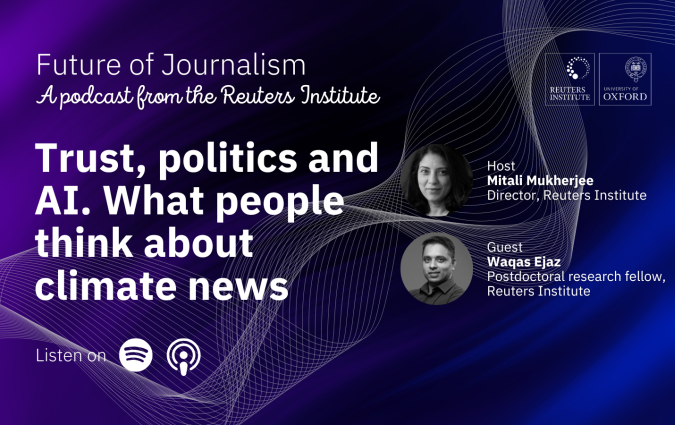Here are the European Communication Conference talks featuring researchers from the Reuters Institute

University of Ljubljana. Canva / Leonid Andronov
This week, members of our research team are attending the 10th European Communication Conference in Ljubljana, Slovenia. The annual gathering hosted by ECREA (the European Communication Research and Education Association) draws some of the continent's top communications researchers to discuss some of the biggest issues and challenges facing journalism. See summaries of the work they will be discussing, and where you can find them at the conference, below.
Changing Levels of Interest in News and Politics in the Last Decade
Richard Fletcher, Waqas Ejaz, Rasmus Kleis Nielsen
Abstract: Individual motivation—often studied in terms of ‘interest’—is typically seen as the primary reason for why some people choose to engage with news and politics. Using nine years of YouGov survey data (2015-2023) from 46 countries and around 650,000 respondents, we explore changes to interest in news and interest in politics over time. We find that (i) there has been a significant overall decline in both interest in news and interest in politics since 2015, and (ii) are evident in almost all countries studied. At the individual level, (iii) both interest in news and interest in politics is higher among older people, men, those with a university education, political partisans, and those with higher trust in news—and that these associations are very consistent across countries. At the societal level, we find that (iv) declining trust in news, increasing platformisation of news, and changing levels of partisanship are associated with lower interest. Our findings highlight important changes to people’s motivation to engage with news and politics, and help us understand emerging trends such as rising news avoidance. They also suggest that changes to the news media environment may be important for understanding changes to interest over time.
Political Communication > News Media Diet (Weds 25 September, 11:00 to 12:30, FDV7)
A Qualitative Analysis of the Mechanisms Underlying the “Trust Nexus”
Amy Ross Arguedas, Camila Mont’Alverne, Benjamin Toff, Richard Fletcher, Rasmus Kleis Nielsen
Abstract: A growing body of work has found evidence of a strong “nexus” between public trust in political institutions and the press in general. While studies have proposed various explanations for this correlation, research examining how audiences think about the relationship between journalism and politics is limited. Furthermore, this association contradicts understandings of journalism as having an adversarial relationship with politicians, an ideal held by journalists and often supported by studies examining the relationship between politicians and journalists. In this paper, we expand our understanding of the trust nexus, drawing on three rounds of qualitative data collection in four countries: Brazil, India the United Kingdom, and the United States. We find evidence supporting that the trust nexus is sustained through both implicit and explicit connections people make between politics and news. On the one hand, participants (1) often conflated news and politics when talking about either and (2) described politicians and journalists in similar kinds of ways, at times categorising both as powerful elites, suggesting some of this linkage may be happening at an unconscious level. On the other hand, many participants also espoused more explicit beliefs or “folk theories” about (3) journalists and politicians working together in a relationship collusion; (4) journalists working for politicians in a relationship of subservience; (5) journalists working on their own behalf, as powerful political actors in their own right, actively participating—or interfering—in political life.
Political Communication > Misinformation and trust in the media (Thurs 26 September 26, 8:00am to 9:30, FDV 6)
In every email we send you'll find original reporting, evidence-based insights, online seminars and readings curated from 100s of sources - all in 5 minutes.
- Twice a week
- More than 20,000 people receive it
- Unsubscribe any time







